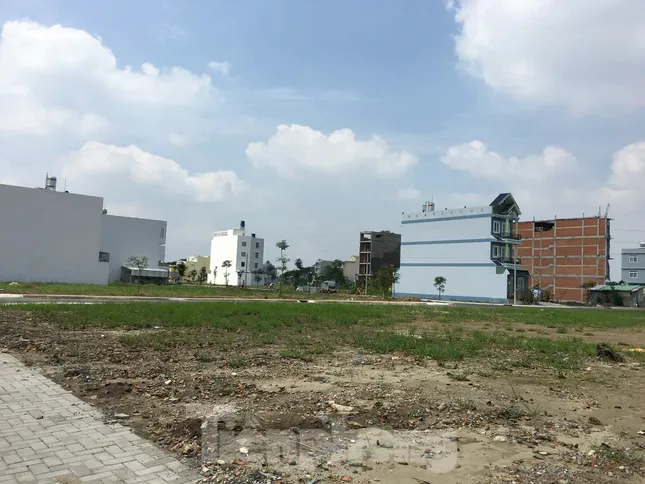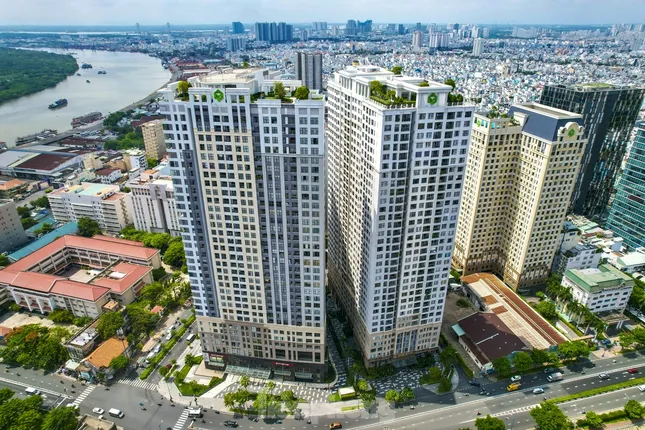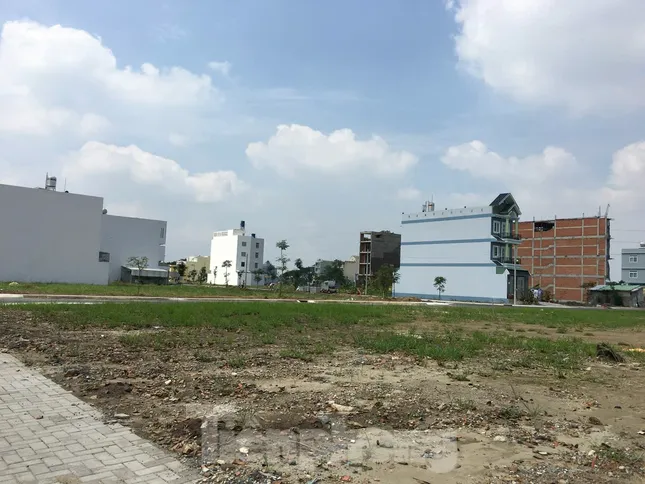Reduce Costs
Mr. Le Hung Tri, a resident of Nha Be district in Ho Chi Minh City, shared that to obtain a construction permit for his 3-story house, he had to prepare a set of documents including an application for a construction permit, construction design drawings, and a copy of the red book as proof of land use rights.
Producing the design drawings alone cost Mr. Tri 15 million VND, and due to his busy work schedule, he had to hire a contractor to handle the permit application process, which cost an additional 10 million VND.
It took almost a month for Mr. Tri’s house to obtain the necessary permit and begin construction. Therefore, he welcomes the news of eliminating the construction permit requirement, believing it will reduce hassles and expenses for citizens.

Eliminating construction permits for houses will reduce hassles and costs for citizens.
Mr. Bui Duc Binh, a contractor with over 20 years of experience in Ho Chi Minh City, shared that currently, obtaining a construction permit takes a minimum of 21 days, excluding cases where adjustments or supplements are required, which can prolong the process to several months or even a year.
Therefore, eliminating the construction permit requirement will benefit citizens by saving them time and money.
Mr. Hoang Kim Hoai, CEO of Phuc Dien Land, also supports the proposal to cut down on procedures related to construction permits, believing it will streamline administration and save time for citizens and businesses. He noted that this regulation was implemented before 2013 and should be reintroduced.
Regarding apartment projects and office buildings, Mr. Hoai suggested that if there is a detailed plan at a scale of 1/500, the requirement for a construction permit should also be waived. As the 1/500 scale plan already provides equivalent information to a construction permit, the steps of basic and technical design can be handled by specialized units hired by investors. If necessary, the state can hire competent units to inspect and allow investors to construct according to the approved plan.
“Reducing administrative procedures such as construction permits and quality inspections will improve the housing supply and help lower housing prices,” said Mr. Hoai. He added that the lengthy procedures currently in place increase investment costs, directly impacting selling prices.
However, Mr. Hoai also emphasized that the new regulation should not compromise management. If citizens violate the registered construction content, they should still be subject to existing regulations on construction order.
Increase Housing Supply
Ms. Giang Huynh, Director of Research & Consultancy at Savills Ho Chi Minh City, affirmed that reforming construction permit procedures is a positive move, especially for real estate developers in the current context.
In reality, obtaining a construction permit often takes 3-6 months, and even longer if a project requires adjustments to its planning or needs input from multiple agencies. This delays not only the implementation process but also increases financial costs, putting pressure on capital and the ability of businesses to turn over their investments.

Streamlining procedures will enable businesses to launch products on time and utilize resources more efficiently.
According to Ms. Huynh, the proposal to waive construction permits for projects with detailed plans at a scale of 1/500 or those located in areas with approved urban designs is reasonable. For these projects, technical indicators such as construction density, height, setbacks, and infrastructure have already been determined, so a construction registration mechanism can replace the traditional permit application process while ensuring compliance and supervision.
“Streamlining procedures will enable businesses to optimize their operations, launch products on time, and utilize resources more efficiently,” said Ms. Huynh. “Overall, this reform can contribute to improving the investment environment and boosting the housing supply in the real estate market.”
However, Ms. Huynh emphasized that this policy must be accompanied by a strict post-inspection system. To ensure comprehensive effectiveness, digitalization should be promoted, and a centralized data system should be built to monitor progress, supervise construction quality, and publicly disclose inspection results.
Simultaneously, construction procedure reforms should be accompanied by resolving more significant bottlenecks in land, planning, and land-use pricing, which are the core constraints on the development of real estate projects today.
Speaking at a conference on implementing Resolution 201/2025 on piloting several special mechanisms and policies for social housing development, Mr. Nguyen Van Duoc, Chairman of the Ho Chi Minh City People’s Committee, said that the city is considering allowing citizens to register for construction instead of applying for permits in areas with clear planning.
Accordingly, Ho Chi Minh City is studying the reduction of administrative procedures in the construction sector to facilitate its citizens. In the future, in areas with clear planning, defined alley boundaries, and specific regulations on architectural standards as stipulated in the city’s architectural management regulations, citizens will not need to apply for construction permits. Instead, they will only need to register their construction plans with the local authorities. The Ho Chi Minh City People’s Committee has assigned the Department of Construction to advise and issue specific guidance in June 2025 to promptly implement this policy.
In a dispatch dated May 29, the Prime Minister requested the Ministry of Construction to reduce construction permit procedures for projects with detailed planning at a scale of 1/500 or located in areas with urban designs. Additionally, the Ministry was directed to review and simplify 361 administrative procedures and 447 business conditions related to the construction sector. The goal is to reduce processing time, compliance costs, and business conditions by at least 30% in 2025.
The Prime Minister also instructed the promotion of decentralization and the delegation of authority to local authorities in construction permit evaluation and issuance. A comprehensive review of the current process is necessary to eliminate redundant steps, especially for projects with detailed planning or located in areas with clear planning.
When Will the Building Permit Be Officially Scrapped?
“During a press conference held on June 4th, Deputy Minister of Construction, Nguyen Danh Huy, emphasized the ministry’s unwavering commitment to streamlining administrative procedures related to licensing. He assured that the ministry is dedicated to thoroughly reviewing, simplifying, and, if necessary, abolishing redundant processes. The ultimate goal is to create a conducive environment that empowers citizens, businesses, and local communities by providing them with efficient and accessible services.”
Streamlining Construction Permits: Creating Positive Momentum in the Market
The Ministry of Construction has taken the initiative to instruct its subordinate units to review and streamline the procedures for issuing construction permits for projects with detailed planning at a scale of 1/500. This proactive approach aims to enhance efficiency and expedite the processes involved in obtaining construction permits for such projects.
The Big Apple Takes a Bite Out of Red Tape: Streamlining Construction with a Pilot Study
“The talented and esteemed Chairman of the People’s Committee of Ho Chi Minh City, Nguyen Van Duoc, has entrusted the Department of Construction with an innovative task. He has directed the department to explore a pilot program that would forgo the need for construction permits in areas with detailed planning or established road boundaries. This forward-thinking approach aims to streamline the construction process and promote efficient urban development in the vibrant city.”
Empowering Homeowners to Build Their Dream Abodes
“The construction experts believe that with proper planning and stringent post-construction audits, the need for construction permits may become obsolete.”





















